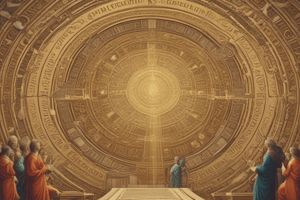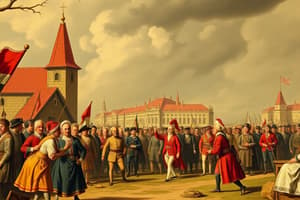Podcast
Questions and Answers
What does the term 'Ancien Regime' refer to?
What does the term 'Ancien Regime' refer to?
- An absolutist political system with a stratified society and strong religious influence. (correct)
- A form of government where power is shared among different branches.
- A movement that encourages international trade and commerce.
- A political system that promotes democracy and social equality.
What characterizes the Enlightenment cultural movement?
What characterizes the Enlightenment cultural movement?
- Advocacy for the social structures of the Ancien Regime.
- A focus on traditional beliefs and religious doctrines.
- Confidence in reason and faith in human progress. (correct)
- Strong support for absolute monarchy.
What was the purpose of the 'Encyclopedia' published by Diderot and D’Alembert?
What was the purpose of the 'Encyclopedia' published by Diderot and D’Alembert?
- To argue against the Enlightenment ideals.
- To summarize the knowledge of the time. (correct)
- To promote the principles of absolute monarchy.
- To document the history of mercantilism.
Which political system attempted to merge absolutism with Enlightenment ideas?
Which political system attempted to merge absolutism with Enlightenment ideas?
What is the main belief of physiocracy?
What is the main belief of physiocracy?
Flashcards
Ancien Regime
Ancien Regime
Term used by French revolutionaries to describe the pre-revolution political system, characterized by absolute monarchy, a rigid social hierarchy, and strong religious influence.
Enlightenment
Enlightenment
A cultural movement emphasizing reason, human progress, and criticism of traditional authority.
Encyclopedia
Encyclopedia
A 28-volume collection compiled by Diderot and D'Alambert, presenting a comprehensive overview of the knowledge of the time.
Absolute Monarchy
Absolute Monarchy
Signup and view all the flashcards
Enlightened Despotism
Enlightened Despotism
Signup and view all the flashcards
Study Notes
18th Century Enlightenment Vocabulary
-
Ancien Régime: A political system with absolute monarchy, a hierarchical society, and strong religious influence. This term was used by French revolutionaries.
-
Enlightenment: A cultural movement emphasizing reason, human progress, and criticism of the old order (ancien régime).
-
Encyclopedia: A 28-volume compilation edited by Diderot and D'Alembert, which summarized 18th-century knowledge. Published between 1751 and 1772.
-
Absolute Monarchy: A political system where the king controls all aspects of governance—executive, legislative, judicial, military, and economic.
-
Enlightened Despotism: A political philosophy that tried to combine absolute rule with Enlightenment ideals of progress.
-
European Supremacy: A situation where one European nation holds significant power and influence over others.
-
Balance of Power: A concept implying equal power among European nations, preventing any one from dominating others.
-
Physiocracy: An economic theory asserting that a nation's wealth originates solely from land resources.
-
Mercantilism: An economic theory that believed a country's wealth was based on accumulating precious metals through international trade.
-
Liberalism: An economic philosophy that viewed individual work, aiming for maximum personal benefit, as the true source of wealth.
Studying That Suits You
Use AI to generate personalized quizzes and flashcards to suit your learning preferences.




